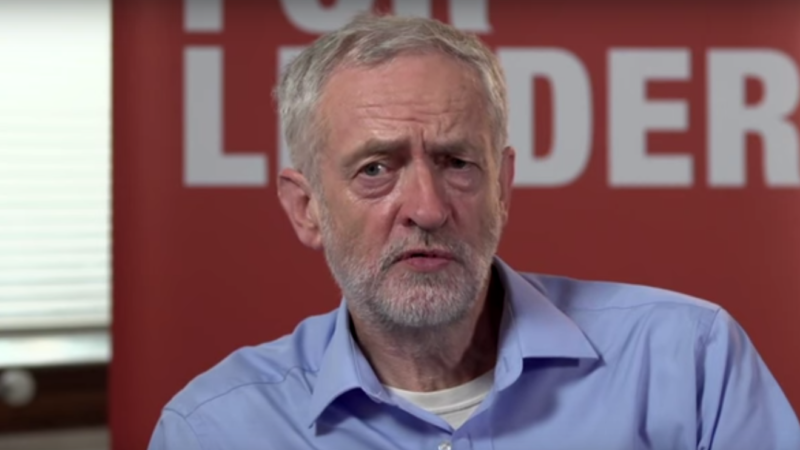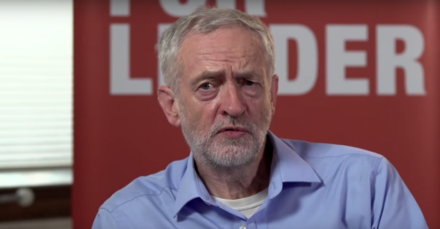

‘If you build it, they will come’ is not a strong enough basis on which to build a political movement. The people running Jeremy Corbyn’s campaign know this. They know that the hundreds of people turning out daily to the leadership candidate’s rallies across the country are not merely turning out because Corbyn is there. Even in a campaign that generates as much excitement as his has, there is a lot of work to be done.
Corbyn does not seem to suffer from arrogance. When I had chance to speak to him a few days ago, he dismissed the chance to talk about an opinion poll that gave him a 32 point lead (since revised to 37 points). He argues that his apparent success has nothing to do with his personality, but is about the triumph of the ideas he espouses.
It is a belief that his supporters are keen to reiterate, and on one level it is a compelling argument. Before a rally in Cardiff last week, one of his campaign staff encouraged me to watch the faces in the crowd as he spoke, rapt by his words, despite the fact that, in their words, he is not a “charismatic” public speaker. True enough, that night over a thousand people crammed into a room and hung on every word of a largely unremarkable speech.
But there is also clearly a personal aspect to his appeal, and one which is well exploited by his campaign: the “Straight talking, honest politics” slogan has become ubiquitous at his events, and highlights part of the specific attraction about him.
Throughout my interview with him, he ponders questions, wonders aloud, and generally fails to deliver prepared lines, as one would expect a politician to do. At one point, I ask him whether he thinks the success of the SNP is more down to anti-austerity or pro-independence feeling. “Not sure,” he replies, “I think it’s a probably a bit of both.”
Without prompting, he expands on the problems facing the Scottish Nationalists, telling me that “their support is such a broad spectrum” and “quite amorphous” that they will, eventually, be at loggerheads. They have a “strong left” but also a “strong business element”, meaning that their future economic direction is “unclear”. It is a warning that looks uncannily familiar to the current travails the Labour Party faces, but such is the way Corbyn brings it up, I find it difficult to believe he was making a pointed remark at all.
While he would happily talk all day about the problems the Conservatives are causing for the country, he is slightly vaguer (with, admittedly, five years before the next election) on the electoral strategy needed to beat them. I ask him about the Fabian Society research that shows four of every five new voters Labour needs in 2020 must come from the Tories. “I think their approach to the research is from the wrong end of the telescope,” he tells me.
There is a pause while he briefly answer his phone. He gets back to London after midnight, he tells the caller. I’m a little taken aback; I’m shattered and will be spending the night in south Wales. Jeremy has done 75 events so far, I’m told, and he’s still bombing around the country. As he comes off the phone, I’m ready to prompt him with my question again – but he doesn’t miss a beat, and he’s straight back into answer.
“Young people who didn’t register, who didn’t vote. Those that did vote were overwhelmingly Labour, so I think there’s a whole area there, and this campaign is demonstrating that. Young people, who are very political, but are not interested in party politics, coming forward. Secondly, the numbers of reliable Labour voters who disappeared into the arms of UKIP or non-voting because they didn’t feel the Labour Party represented anything they wanted to hear, do or say. I think we can grow our support that way. Do we have to win back people who voted for other parties? Yeah, but we have to say to people, in a very clear way, what we’re offering.”
That means trying to change the conversation (a favourite phrase of Corbynites) on issues such as welfare. “If all that your average voter hears is politicians saying they’re going to be tough on welfare, newspapers calling everyone who legitimately claims benefits a scrounger and programmes like Benefits Street demonising those that claim benefits, is it surprising that that is then reflected in polls?”
But how will policy be made? Corbyn wants to give Labour’s annual conference “more authority” in policy making. I put it to him that that could lead to big decisions just being made by people who like going to lots of political meetings, which arguably doesn’t open up politics very much at all. “At the moment it’s made by people who don’t go to political meetings and are just experts,” he shrugs, “Surely people going to meetings is an improvement on those who don’t go to meetings?”
It’s not just conference, though. “Economic policy, environmental policy, constitutional issues” should be approached with “open conventions”, while the annual leadership elections he has spoken of at hustings would be all-member ballots. That would be expensive, I say, potentially bankrupting the party. “Yeah, but there is a democratic issue involved,” he replies. “You can do it lots of ways.”
While he isn’t precise about this, something he would put down to the fact he wouldn’t “have the last word on this”, he cites the system Tony Benn and Eric Heffer used to challenge the leadership in 1988 as a potential model. This would allow the chance for, but not necessitate, the leadership to be challenged once a year.
He is light-hearted about the reporting of the previous weekend’s Clause IV controversy, and says he prefers the old Clause IV to the current one: “I supported the old Clause IV against the Blair reforms in ’94, so if you ask me which one I prefer it’s fairly obvious.” However, if it were to be changed again, he would like something that does not just include “common ownership”, but also “recognises issues of equality, social justice, gender equality, diversity in Britain”.
Despite the fact that Corbyn was “never in favour of the registered supporter system”, his campaign has used the system deftly; their ability to sign up supporters is unmatched by other candidates. In part, this is down to some superb political communication, such as the ‘Welcome home’ images that did the rounds on social media. While he is excited about the prospect of the “wider franchise”, he is very clear that he thinks these supporters “should convert into membership” and take part in the new policy processes he wants to implement.
When I attended the rally that evening, I was left in no doubt how real Corbynmania is, and why the other candidates struggle to lay a finger on the veteran leftie. It is not just that there is no singular identifiable demographic driving the surge, but more that there are no shared political assumptions between his supporters and others.
In one of the warm-up speeches, a trade unionist tells the crowd that the 1983 manifesto was about “workers’ rights, nationalisation and abolishing nuclear weapons”. He asks the heaving crowd “What was wrong with that?” and a huge roar goes up. Nebulous demands for ‘credibility’ won’t quite cut it for them. That’s why he’s winning.




More from LabourList
Letters to the Editor – week ending 07 December 2025
“You ever try to tell a story with no villain?” LabourList interview with Keith Ellison
‘Delays today, stronger democracy tomorrow – Labour is right to wait for SV for mayoral elections’